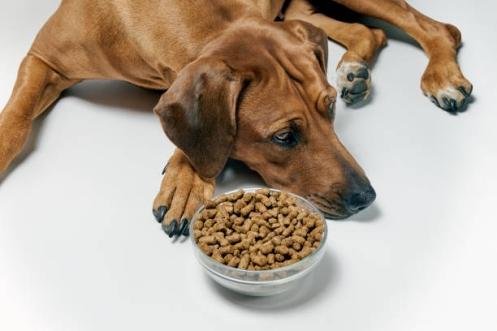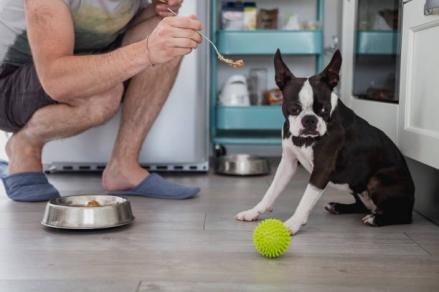
3 minute read
Pet Health & Well-being
Here are some common reasons.
What are some common reasons for a dog to stop eating? When a dog stops eating it is referred to as anorexia. Dogs can become anorexic for many reasons. Sometimes it is an indication of a gastrointestinal issue. This could range from a simple cause like gastroenteritis to a more serious issue like gastrointestinal neoplasia or cancer. Gastroenteritis often occurs when dogs eat something out of the ordinary, from a new food or treat to getting into the garbage or ingesting something outside. Loss of appetite can also be a sign of other systemic illnesses such as kidney or liver disease, pancreatitis, and numerous other medical issues.
Advertisement
What illnesses are associated with a dog not eating? There are countless medical causes for a dog to stop eating. Some are simple and can resolve spontaneously or get better with some simple medical intervention while others are more serious and require more extensive testing and treatment. The most common reason that we see dogs stop eating is gastroenteritis. This is inflammation of the gastrointestinal tract that occurs in dogs most commonly when they eat something out of the ordinary. More serious causes tend to result in a more gradual or persistent loss of appetite. These might include renal disease, liver disease, pancreatitis, cancer, and many other systemic illnesses. How can dental issues affect a dog's appetite? Dental issues should not affect your dog's appetite. Dogs are good at eating in a way to avoid oral pain. Dental issues can affect your dog's comfort when eating (he may drool excessively or have trouble picking up or chewing food), but he will still feel hungry and should show interest in food when it is offered.
What are food issues dog experience? The most common food issue that we see
Can a change in surroundings affect a dog's appetite? A change in surrounding can affect a dog's appetite temporarily. If you have a dog who is easily stressed or normally has a picky appetite, then moving to a new home, boarding, or being cared for in another home could cause a dog to eat less or refuse food for a few days. But an otherwise healthy dog will eat when she is hungry or accept tempting food like chicken, ground beef, or treats. in veterinary medicine is often referred to as a food allergy. This occurs when a pet has a hypersensitivity to a certain protein source (such as chicken or beef) used in food. The most common symptom of food allergies is actually itchiness of the skin. There are special prescription veterinary diets formulated with novel protein sources (duck, salmon, venison) or hydrolyzed proteins that are used to treat food allergies.

How long can a dog go without eating? A dog can go for several days without eating and it does not cause bodily harm. Cats are very different and should not go more than 2 or 3 days without eating. Of course, both dogs and cats cannot go without drinking for more than a day or two without suffering dehydration.
When is it necessary to see a specialist about your dog not eating? If your dog stops eating, you can wait a day or two to see if his appetite returns. If your dog is experiencing other symptoms, like vomiting, diarrhea, or lethargy he should be evaluated by a veterinarian within 24 hours. If your dog has a persistent loss of appetite and has seen either your primary veterinarian or an emergency veterinarian, has had initial testing done (bloodwork, x-rays, ultrasound), and has not responded to initial medical therapy, then he should be seen by a specialist. The type of specialist depends on the results of initial testing and could range from an Internal Medicine Specialist to a Dermatologist, or a Surgeon.
CELEBRATING OVER 30 YEARS OF SPECIALIZIED VETERINARY SERVICE AND 24 HOUR EMERGENCY CARE





